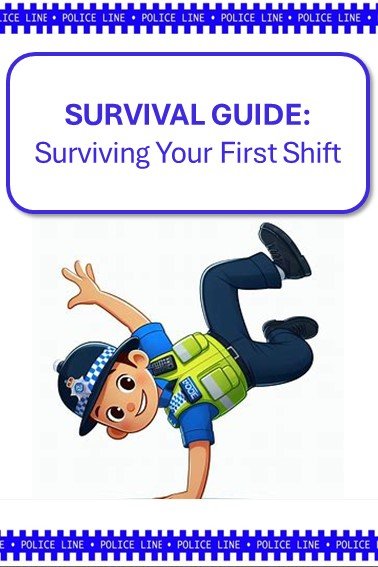Buckle up! You’re about to dive headfirst into your first shift as a shiny new police officer. You’ve survived training school, now your heart’s racing, your palms are sweaty, and second thoughts are creeping in. But hey, take a deep breath and shake it off. We’ve all been there, staring into the unknown, feeling like a deer caught in the headlights. Trust me, if you weren’t a bundle of nerves, I’d be worried. But don’t sweat it, we’ve got your back with some tried-and-true tips to help you navigate your first shift.
Get a Good Nights Sleep
You’ll normally (but not always) start with your new team on ‘earlies’, likely a 7am (07:00) start.
Catch Some Z’s.
Before you even step foot into your uniform, make sure you’ve had a good night’s sleep.
Trust me, you’re going to need it.

Your first shift will be a whirlwind of new experiences and information, and you’ll want to be at your sharpest. So, turn off the Netflix, put down your phone, and hit the hay early.
A well-rested mind is a prepared mind, and you’ll thank yourself in the morning when you’re raring to go.
Remember, this isn’t just another day at the office, it’s the start of your journey in the force. So, rest up, and get ready to hit the ground running.
Gear Up: Getting Your Uniform Sorted
Before you hit the sack, take some time to prep your kit for the big day.
Trust me, the last thing you want is to be scrambling around in the morning looking for a missing piece of gear.
Lay out your uniform, ensuring it’s clean, ironed, and ready to wear.
Give your boots a good polish – a pair of gleaming boots can set the tone for your entire shift. Check and double-check that you have everything you need – your badge, your handcuffs, your radio.
Remember, a good officer is a prepared officer.
So, get your gear in order. It’s all part of the job, and it’s your first step towards a successful first day on the force.
If you’re not sure what ‘extras’ you need for your locker, check out this article.
Sweeten the Deal
Who doesn’t love a good cake? Bring some along for your first shift.
As much as bribery doesn’t fit with the Code of Ethics, it’s a surefire icebreaker and a quick way to win over your new team.
A box of Krispy Kremes might even earn you some brownie points.
Learn Your Teams Names: Know Your Squad
Now, here’s a crucial piece of advice – learn your team’s names. It may seem like a small thing, but trust me, it’s a big deal.
Knowing your colleagues by name not only shows respect, but it also fosters a sense of camaraderie and trust.
You’re going to be relying on these folks in some pretty intense situations, and knowing them on a first-name basis can make all the difference.
So, make it a priority to learn their names, and use them.
It’s a simple gesture, but it can go a long way in building strong relationships within your team.
After all, you’re not just joining a force, you’re joining a family.
Learn Skills Set
TOP TIP: When I was new I kept a list in the back of a notebook with my colleagues names and numbers (so I could ring them over the airwaves if I needed anything). Then, I added another column for that persons skills set(s).
That way you’ll know who to call for a TOR verses who to call when you need help with a file!
Listen and Learn
Remember, you’ve got two ears and one mouth. Use them in that ratio. If something doesn’t add up, don’t hesitate to ask. But pick your moment wisely.
A quiet, appropriate time is best.
Trust me, two eyes and ears are always better than one.
Respect the Chain of Command
One of the most important lessons for a new cop is to listen – really listen – to your tutor, sergeant, and colleagues.
These are the folks who’ve been in the trenches, who’ve seen it all, and who have invaluable wisdom to share.
They’re your lifeline, your guide, your mentor.
So, when they speak, pay attention.
Their advice could save your life, or someone else’s, one day.
Don’t be afraid to ask questions, but also know when to simply listen and absorb. Remember, you’re the new kid on the block, and there’s a lot to learn.
So, keep your ears open, your mouth closed, and your mind receptive. Respect the chain of command, and you’ll earn their respect in return.
Question Time: The Art of Learning
Your tutor is your guiding light in this new world. They’ve walked the beat, they’ve faced the challenges, and they’ve come out the other side with a wealth of knowledge that’s now at your disposal.
So, when they’re speaking, make sure you’re listening.
They’re not just giving orders – they’re imparting wisdom.
Now, let’s be real. There will be times when something doesn’t quite make sense to you.
That’s normal.
You’re new, you’re learning, and it’s okay to not know everything.
But here’s the key – if you’re unsure about something, don’t challenge your tutor in front of the team.
It’s not about being submissive, it’s about showing respect for their experience and the chain of command.
Instead, make a mental note of your question, or scribble it down, and bring it up during a debrief or a quiet moment later on.
This is a more suitable time for feedback and questions.
This shows that you’re engaged, you’re eager to learn, and you respect the knowledge and experience of your tutor.
Plus, it gives you the opportunity to discuss the issue in depth without the pressure of an ongoing situation.
Remember, every question you ask and every answer you receive is a stepping stone on your journey to becoming a seasoned officer.
So, don’t be afraid to ask, to learn, and to grow. Just make sure you’re doing it at the right time and in the right way.
The Power of Observation
Now, here’s a secret weapon that every new officer should have in their arsenal – the power of observation.
As a new officer, you’re surrounded by a team of seasoned officers, each with their own unique style and approach to the job.
Watching them, learning from them, and taking the best bits from each of them can be a game-changer in your journey to becoming the best police officer you can be.
It’s rare that you’re going to find one officer that is amazing at everything, so steal with pride from each person.
Observe how they handle different situations, how they interact with the public, how they deal with stress.
Notice their strengths, their techniques, their strategies.
Each of your colleagues is a potential teacher, offering you a wealth of knowledge and experience that you can tap into.
But remember, it’s NOT about copying them.
It’s about learning from them and then adapting what you’ve learned to suit your own style and strengths.
You’re not here to become a carbon copy of someone else. You’re here to become the best version of yourself.
So, watch, learn, and grow.
And then take all that you’ve learned and use it to carve out your own path in the force.
One day, somebody will be learning off you.
Note it Down: The Devil’s in the Details
Don’t underestimate the power of a well-kept notebook. Write everything down – and I mean everything.
From the most complex procedures to the simplest tasks, like which button to click on the computer system.
It might seem tedious at first, but trust me, it’s a practice that will pay off.
By noting down processes and procedures in detail, you’re creating a personal handbook, a reference guide that you can turn to whenever you’re unsure.
It’s a safety net, a memory aid, and a learning tool all rolled into one.
Plus, it shows your colleagues that you’re serious about the job, that you’re committed to learning, and that you have a keen eye for detail.
But here’s the real kicker.
By documenting everything, you’re not just helping yourself, you’re also becoming a valuable resource for your team.
You’ll be the go-to person when someone forgets a procedure or needs a refresher on a process.
You’ll be the one who has the answers, the one who can help your team function more efficiently, you won’t be the ‘newbie’ any more.
So, grab that notebook, OneNote, or however you work, and start writing. It might take a while to understand why it’s so important, but when you do, you’ll thank your past self for being so diligent.
And your team? They’ll thank you too.
This will naturally lead onto you having the confidence to step up
Be a Go-Getter and Step Up
When you step onto a bustling scene, don’t just stand there like a deer in headlights. Be a go-getter. Approach your tutor and ask what they need from you.
If they’re swamped, don’t wait for instructions. Use your initiative and keep yourself busy.
There’s always something to do at a scene.
Hold back onlookers to maintain the integrity of the scene.
Gather first-hand accounts from witnesses, their perspectives could be crucial to the case. Take down contact details meticulously, you never know when you might need to circle back for more information.
But don’t stop there.
Step up and volunteer for the mundane tasks. Yes, they might not be glamorous, but they’re essential.
It could be making a round of teas for the team or booking in property. Everyone’s been there, and now it’s your turn.
Stepping up to these tasks shows your team that you’re not above any job, that you’re a team player.
It’s a surefire way to earn the respect of your team.
And remember, this phase won’t last forever.
It’s just a rite of passage that every new officer goes through. So, embrace it, learn from it, and use it as an opportunity to show your team what you’re made of.
Safety First: The Golden Rule
In the adrenaline-fueled world of policing, it’s easy to get caught up in the thrill of the chase. But remember this – your safety, and that of your colleagues, is paramount. It’s the golden rule that should guide every decision you make, every action you take.
Chasing down a suspect might seem like an exhilarating scene straight out of a cop movie, but in reality, it’s a high-risk situation that can put lives at risk.
It’s not about being a hero, it’s about being smart. Slow and steady wins the race.
Always keep your officer safety training at the forefront of your mind.
Use your protective gear (PPE), call for backup when needed, and never rush into a situation without assessing the risks first.
Remember, a safe officer is an effective officer.
But it’s not just about your safety. By prioritizing safety, you’re also showing your colleagues that you’re someone they can trust, someone they can feel safe working with.
It’s about creating a sense of mutual trust and respect, a bond that can make all the difference when you’re out there on the streets.
So, always put safety first. It’s the mark of a true professional, a dedicated officer, and a valued member of the team.
Tune In: Your Lifeline
In the world of policing, your radio is more than just a piece of equipment. It’s your lifeline, your connection to your team, and your source of real-time information.
So, keep your ear tuned in, stay in the loop with what’s happening in your area.
Listening to your radio isn’t just about hearing the chatter, it’s about understanding the situation, interpreting the codes, and responding appropriately.
It’s about being able to risk assess on the fly, to make informed decisions based on the information you’re receiving.
When a call comes in, don’t just rush off. Take a moment to clarify the situation. Ask about possible warnings or risks associated with the call.
This will allow you to prepare mentally and physically for what you might encounter, and to ensure you have the necessary backup and resources on hand.
And when you use your radio, think before you speak. Clear, concise communication is key. Yes, you’ll stumble, you’ll fumble, you’ll get tongue-tied.
But hey, who doesn’t?
It’s all part of the learning process.
I’ve got some really embarrising stroies I could tell you about some of my radio mistakes, but I’ll save them for another day!
So, tune in, stay sharp, and use your radio wisely.
‘s not just about keeping yourself safe, it’s about ensuring the safety of your team and the public you’re sworn to protect.
Embrace the Challenge
Here’s a piece of advice that might seem counterintuitive – volunteer for the ‘difficult jobs’, the ones that scare you.
Whether it’s responding to a road traffic collision (RTC) or dealing with a sudden death, these are the situations that can test your mettle and push you out of your comfort zone.
Yes, they’re tough.
Yes, they’re daunting. But they’re also the jobs that will teach you the most.
They’ll give you firsthand experience in handling high-pressure situations, dealing with trauma, and managing your own emotions in the face of adversity.
I remember my first shift, I was praying that I didn’t have to deal with a dead body. It was the one thing that really scared me. We hadn’t event finished the morning briefing when my tutor and I got depoyed to a SD (sudden death).
I was inwardly panicking the whole way there, I don’t know why. But after day one, the fear was gone. I’d dealt with a dead body, passed on a death message and survived. I could deal with anything.
Even now, 20 years on, I can still picture the body and remember the conversation with the NOK (next of kin). I’ve been to hundreds of bodies since, none of which have stuck in my mind in the same way.
The sooner you expose yourself to these situations, the sooner you’ll learn how to handle them.
You’ll demystify your fears, build your confidence, and develop the resilience needed to face whatever the job throws at you.
Remember, being a police officer isn’t just about enforcing the law. It’s about dealing with the realities of life, in all its messy, unpredictable, and sometimes heartbreaking glory.
So, don’t shy away from the difficult jobs. Embrace them, learn from them, and grow from them. It’s all part of becoming the best officer you can be.
Final Thoughts: Survivng Your First Shift As A Student Officer
Your first shift as a PC will be daunting, it will undoubtatby be overwhelming, but enjoy it! You’ll find yourself in some weird and wonderful situations, see things that will have you in stitches, and collect a treasure trove of stories. Cherish the camaraderie with your colleagues, even those you only meet for a shift. When the job gets tough, remember the good times. You’re in for one hell of a ride.
Welcome to the force, and best of luck!


